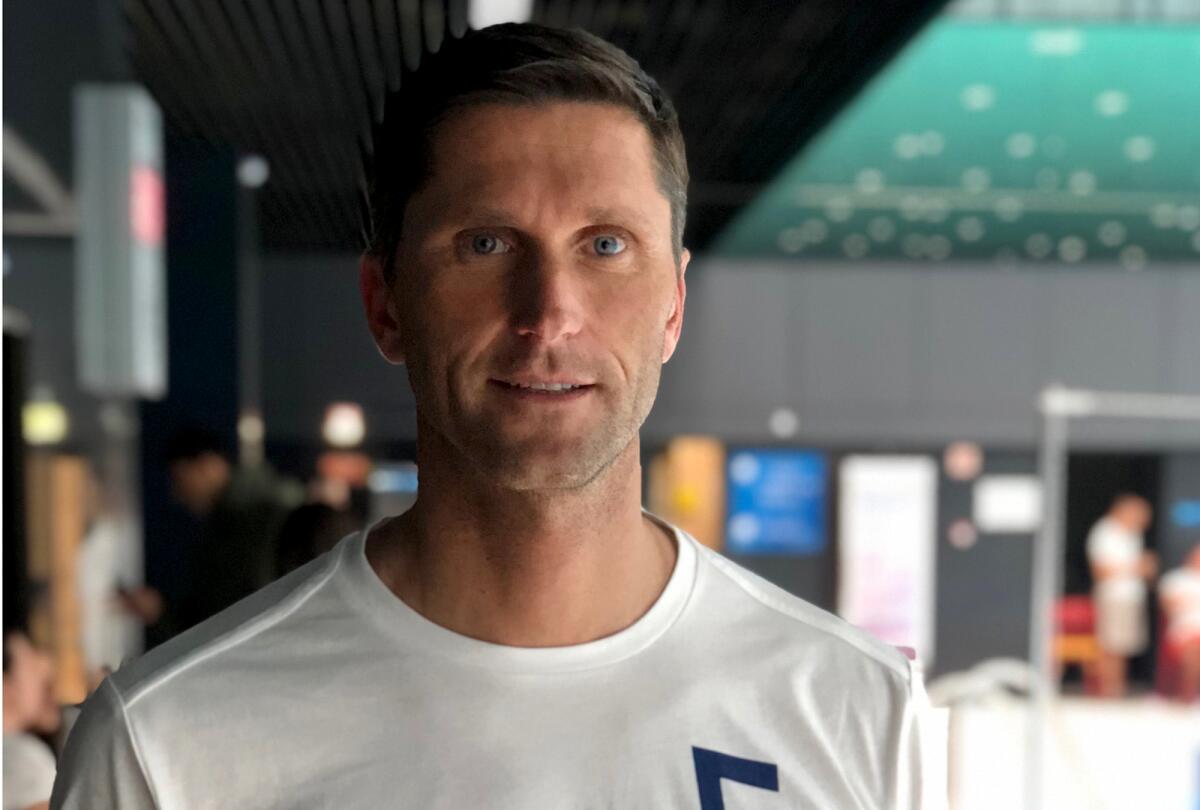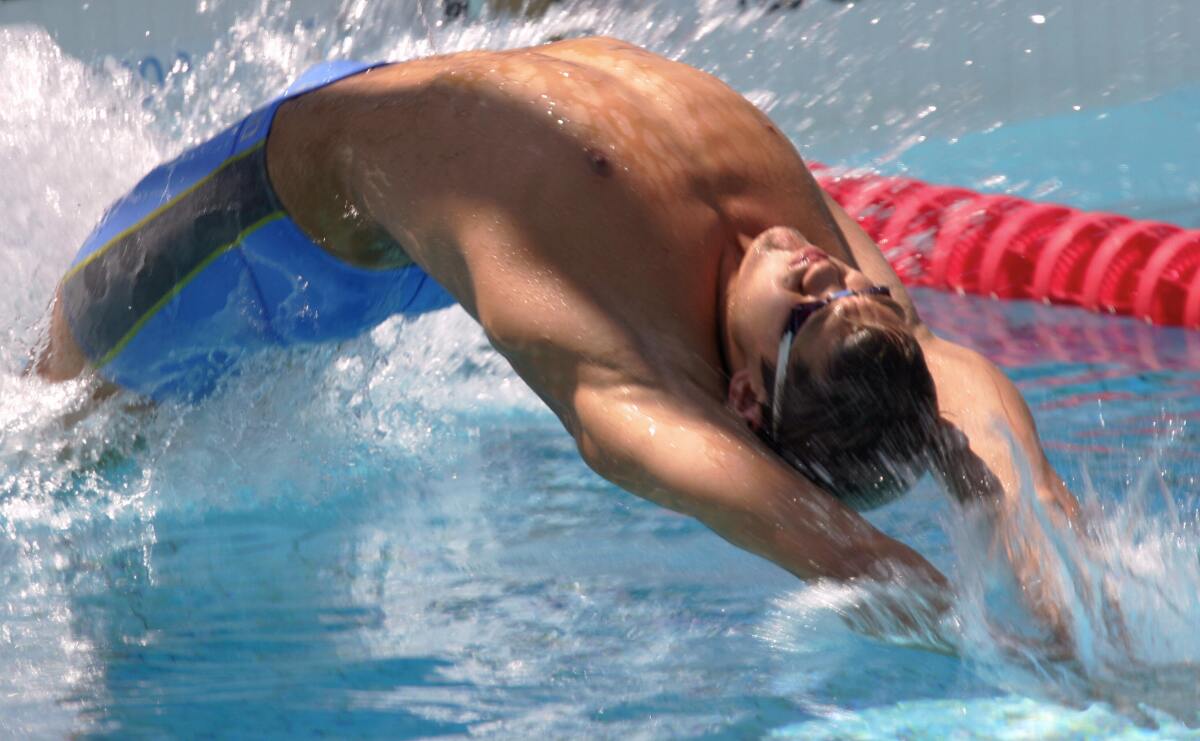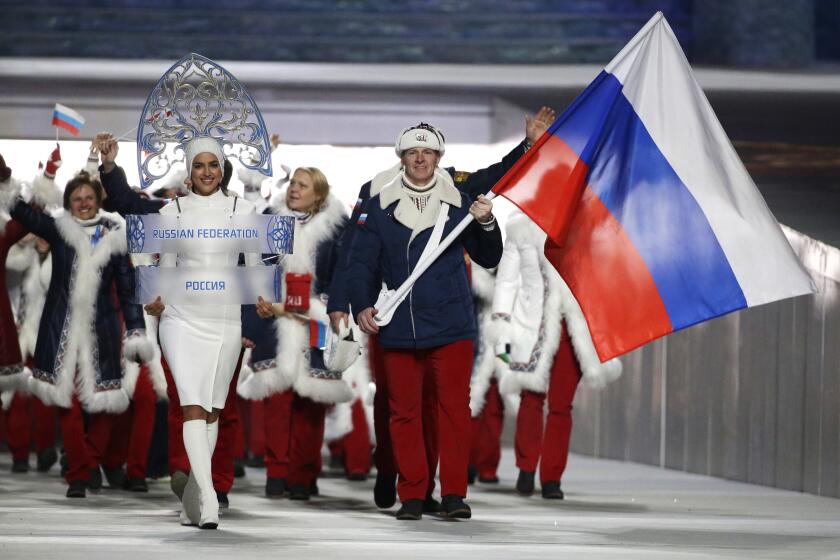Former Olympic swimmer looks to bring another professional sports title to L.A.

- Share via
Lenny Krayzelburg is a four-time Olympic gold medal-winning swimmer, a former world record holder and a USC Hall of Famer. He’s also an avid Los Angeles sports fan, who has been waiting for the city to celebrate another professional sports championship for a few years now.
This weekend he leads the Los Angeles Current of the International Swimming League to Las Vegas for the first-ever Grand Final. The championship of the first-year professional swimming league will pit the Current against the London Roar, Cali Condors from San Francisco and Energy Standard from Turkey.
“I’m a die-hard Lakers fan,” Krayzelburg said. “I want to see the L.A. Current win this weekend and the Lakers win in June.”
Krayzelburg, who starred in the 2000 and 2004 Summer Olympics, is the general manager of the Current and in March put together the roster of 28 swimmers, split evenly between men and women. As he prepared for this weekend’s final at Mandalay Bay ahead of the 2020 Summer Olympics in Tokyo, he wishes he had a similar professional league when he was swimming competitively.
Russian athletes will be allowed to compete in major events only if they are not implicated in positive doping tests or if their data were not manipulated.
Swimming is one of the most popular sports during the Summer Olympics, creating international stars such as Michael Phelps, Mark Spitz, Ryan Lochte, Dara Torres, Natalie Coughlin and Jenny Thompson. The problem is those stars generally disappear after the Olympics before possibly returning four years later.
“There’s not much exposure for swimmers outside of the Olympics every four years,” Krayzelburg said. “There’s no consistent salary for being a professional swimmer or a league where you can consistently compete and for fans to watch their favorite swimmers. That’s what the ISL is providing.
“This is incredibly important for the sport and for the athletes to be able to build their own brand outside of the Olympics. Honestly, unless you’re Michael Phelps, after the Olympics you’re done and everyone forgets about you for the next three and a half years.”
The inaugural season of the ISL featured eight teams with rosters composed of male and female swimmers. There are seven meets in seven cities around the world culminating in this weekend’s final, featuring the top two American and European teams.
Krayzelburg believes the league will not only allow swimmers to compete and stay in the public eye outside of the Olympics but also be able to make a salary. Collegiate swimmers, and other athletes in Olympic sports, can’t be paid for competing in international competitions if they want to compete in college. He recalls winning two gold medals and a silver medal at the 1998 World Championships but having to forgo $50,000 in prize money because he was still swimming at USC. The NCAA is working on a plan to allow college athletes to benefit from the use of their name, image and likeness by 2021. And more than 20 states are considering legislation similar to California’s Fair Pay to Play Act to give those rights to athletes.

“I think this is an opportunity for athletes in Olympic sports that don’t get the exposure or opportunity to play in a professional league to capitalize on their name, image and likeness,” Krayzelburg said. “Many collegiate gymnasts and swimmers are going to the Olympics and winning medals but they can’t get a piece of the well-deserved money or endorsement deals that go with that if they want to go back and compete in college.”
Krayzelburg spoke as he sat outside of his SwimRight Academy at the Westside Jewish Community Center. He helped refurbish the aquatic center more than a decade ago after swimming at the center’s pool while he went to Fairfax High School, which didn’t have a swim team. He and his family fled religious persecution in the Soviet Union and moved to Los Angeles in 1989 when he was 13 years old.
After swimming at Santa Monica College, he transferred to USC, where he became a nine-time All-American. He retired in 2008 and focused on his swim school, which helps children learn how to swim and about water safety.
“It’s unreal to me that this is the place where I started to swim and now I get to come back help provide these lessons for thousands of kids,” Krayzelburg said. “To be able to make a difference where it started for me is humbling.”
As much as Krayzelburg wants to win a championship for Los Angeles, he admits the ISL and the Current need to do a better job of connecting with the city going into next season. None of the Current swimmers lives in Los Angeles and the team did not hold a single meet in the city this season. Krayzelburg has the only real connection to Los Angeles and is confident that will change next year.
“The plan is for next season to be six months and for each club to host a match in their local city, so we will host a match in L.A. next year,” he said. “We want to bring a championship to Los Angeles and build a fan base here.”
More to Read
Go beyond the scoreboard
Get the latest on L.A.'s teams in the daily Sports Report newsletter.
You may occasionally receive promotional content from the Los Angeles Times.












